- Home
- W. Somerset Maugham
The Razor's Edge
The Razor's Edge Read online
Table of Contents
EX LIBRIS
About the Author
By the Same Author
Title Page
Copyright Page
PART ONE Chapter 1
Chapter 2
Chapter 3
Chapter 4
Chapter 5
Chapter 6
Chapter 7
Chapter 8
Chapter 9
Chapter 10
PART TWO Chapter 1
Chapter 2
Chapter 3
Chapter 4
Chapter 5
Chapter 6
Chapter 7
PART THREE Chapter 1
Chapter 2
Chapter 3
Chapter 4
Chapter 5
PART FOUR Chapter 1
Chapter 2
Chapter 3
Chapter 4
Chapter 5
Chapter 6
Chapter 7
Chapter 8
Chapter 9
PART FIVE Chapter 1
Chapter 2
Chapter 3
Chapter 4
Chapter 5
Chapter 6
Chapter 7
Chapter 8
Chapter 9
PART SIX Chapter 1
Chapter 2
Chapter 3
Chapter 4
Chapter 5
Chapter 6
Chapter 7
Chapter 8
PART SEVEN Chapter 1
Chapter 2
Chapter 3
Chapter 4
Chapter 5
Chapter 6
THE HISTORY OF VINTAGE
www.vintage-classics.info
EX LIBRIS
VINTAGE CLASSICS
THE RAZOR'S EDGE
William Somerset Maugham was born in 1874 and lived in Paris until he was ten. He was educated at King's School, Canterbury, and at Heidelberg University. He spent some time at St. Thomas' Hospital with the idea of practising medicine, but the success of his first novel, Liza of Lambeth, published in 1897, won him over to letters. Of Human Bondage, the first of his masterpieces, came out in 1915, and with the publication in 1919 of The Moon and Sixpence his reputation as a novelist was established. At the same time his fame as a successful playwright and short story writer was being consolidated with acclaimed productions of various plays and the publication of The Trembling of a Leaf, subtitled Little Stories of the South Sea Islands, in 1921, which was followed by seven more collections. His other works include travel books, essays, criticism and the autobiographical The Summing Up and A Writer's Notebook.
In 1927 Somerset Maugham settled in the South of France and lived there until his death in 1965.
OTHER WORKS BY W. SOMERSET MAUGHAM
Novels
The Moon and Sixpence
Of Human Bondage
The Narrow Corner
Cakes and Ale
Ashenden
The Merry-Go-Round
The Painted Veil
Catalina
Up at the Villa
Mrs Craddock
The Casuarina Tree
Christmas Holiday
Liza of Lambeth
The Magician
Theatre Then and Now
Collected Short Stories
Collected Short Stories Vol. 1
Collected Short Stories Vol. 2
Collected Short Stories Vol. 3
Collected Short Stories Vol. 4
Short Stories
Far Eastern Tales
More Far Eastern Tales
Travel Writing
On a Chinese Screen
Don Fernando
Literary Criticism
Ten Novels and their Authors
Points of View
Autobiography
The Summing Up
A Writer's Notebook
W. SOMERSET MAUGHAM
The Razor's Edge
This eBook is copyright material and must not be copied, reproduced, transferred, distributed, leased, licensed or publicly performed or used in any way except as specifically permitted in writing by the publishers, as allowed under the terms and conditions under which it was purchased or as strictly permitted by applicable copyright law. Any unauthorised distribution or use of this text may be a direct infringement of the author's and publisher's rights and those responsible may be liable in law accordingly.
ISBN 9781407016542
Version 1.0
www.randomhouse.co.uk
Published by Vintage 2000
15 17 19 20 18 16 14
Copyright © the Royal Literary Fund
W. Somerset Maugham has asserted his right under the Copyright, Designs and Patents Act 1988 to be identified as the author of this work
This electronic book is sold subject to the condition that it shall not by way of trade or otherwise, be lent, resold, hired out, or otherwise circulated without the publisher's prior consent in any form other than that in which it is published and without a similar condition including this condition being imposed on the subsequent purchaser
First published in Great Britain by William Heinemann in 1944
Vintage
Random House, 20 Vauxhall Bridge Road,
London SW1V 2SA
www.vintage-classics.info
Addresses for companies within The Random House Group Limited can be found at: www.randomhouse.co.uk/offices.htm
The Random House Group Limited Reg. No. 954009
A CIP catalogue record for this book
is available from the British Library
ISBN: 9781407016542
Version 1.0
PART ONE
1
I have never begun a novel with more misgiving. If I call it a novel it is only because I don't know what else to call it. I have little story to tell and I end neither with a death nor a marriage. Death ends all things and so is the comprehensive conclusion of a story, but marriage finishes it very properly too and the sophisticated are ill-advised to sneer at what is by convention termed a happy ending. It is a sound instinct of the common people which persuades them that with this all that needs to be said is said. When male and female, after whatever vicissitudes you like, are at last brought together they have fulfilled their biological function and interest passes to the generation that is to come. But I leave my reader in the air. This book consists of my recollections of a man with whom I was thrown into close contact only at long intervals, and I have little knowledge of what happened to him in between. I suppose that by the exercise of invention I could fill the gaps plausibly enough and so make my narrative more coherent; but I have no wish to do that. I only want to set down what I know of my own knowledge.
Many years ago I wrote a novel called The Moon and Sixpence. In that I took a famous painter, Paul Gauguin, and, using the novelist's privilege, devised a number of incidents to illustrate the character I had created on the suggestions afforded me by the scanty facts I knew about the French artist. In the present book I have attempted to do nothing of the kind. I have invented nothing. To save embarrassment to people still living I have given to the persons who play a part in this story names of my own contriving, and I have in other ways taken pains to make sure that no one should recognize them. The man I am writing about is not famous. It may be that he never will be. It may be that when his life at last comes to an end he will leave no more trace of his sojourn on earth than a stone thrown into a river leaves on the surface of the water. Then my book, if it is read at all, will be read only for what intrinsic interest it may possess. But it may be that the way of life that he has chosen for himself and the peculiar strength and sweetness of his character may have an ever-growing influence over his fel
low men so that, long after his death perhaps, it may be realized that there lived in this age a very remarkable creature. Then it will be quite clear of whom I write in this book and those who want to know at least a little about his early life may find in it something to their purpose. I think my book, within its acknowledged limitations, will be a useful source of information to my friend's biographers.
I do not pretend that the conversations I have recorded can be regarded as verbatim reports. I never kept notes of what was said on this or the other occasion, but I have a good memory for what concerns me, and though I have put these conversations in my own words they faithfully represent, I believe, what was said. I remarked a little while back that I have invented nothing; I want now to modify that statement. I have taken the liberty that historians have taken from the time of Herodotus to put into the mouths of the persons of my narrative speeches that I did not myself hear and could not possibly have heard. I have done this for the same reasons as the historians have, to give liveliness and verisimilitude to scenes that would have been ineffective if they had been merely recounted. I want to be read and I think I am justified in doing what I can to make my book readable. The intelligent reader will easily see for himself where I have used this artifice, and he is at perfect liberty to reject it.
Another reason that has caused me to embark upon this work with apprehension is that the persons I have chiefly to deal with are American. It is very difficult to know people and I don't think one can ever really know any but one's own countrymen. For men and women are not only themselves; they are also the region in which they were born, the city apartment or the farm in which they learnt to walk, the games they played as children, the old wives' tales they overheard, the food they ate, the schools they attended, the sports they followed, the poets they read, and the God they believed in. It is all these things that have made them what they are, and these are the things that you can't come to know by hearsay, you can only know them if you have lived them. You can only know them if you are them. And because you cannot know persons of a nation foreign to you except from observation, it is difficult to give them credibility in the pages of a book. Even so subtle and careful an observer as Henry James, though he lived in England for forty years, never managed to create an Englishman who was through and through English. For my part, except in a few short stories, I have never attempted to deal with any but my own countrymen, and if I have ventured to do otherwise in short stories it is because in them you can treat your characters more summarily. You give the reader broad indications and leave him to fill in the details. It may be asked why, if I turned Paul Gauguin into an Englishman, I could not do the same with the persons of this book. The answer is simple: I couldn't. They would not then have been the people they are. I do not pretend that they are American as Americans see themselves; they are American seen through an English eye. I have not attempted to reproduce the peculiarities of their speech. The mess English writers make when they try to do this is only equalled by the mess American writers make when they try to reproduce English as spoken in England. Slang is the great pitfall. Henry James in his English stories made constant use of it, but never quite as the English do, so that instead of getting the colloquial effect he was after, it too often gives the English reader an uncomfortable jolt.
2
In 1919 I happened to be in Chicago on my way to the Far East, and for reasons that have nothing to do with this narrative I was staying there for two or three weeks. I had recently brought out a successful novel and being for the moment news, I had no sooner arrived than I was interviewed. Next morning my telephone rang. I answered.
'Elliott Templeton speaking.'
'Elliott? I thought you were in Paris.'
'No, I'm visiting with my sister. We want you to come along and lunch with us today.'
'I should love to.'
He named the hour and gave me the address.
I had known Elliott Templeton for fifteen years. He was at this time in his late fifties, a tall, elegant man with good features and thick waving dark hair only sufficiently greying to add to the distinction of his appearance. He was always beautifully dressed. He got his haberdashery at Charvet's, but his suits, his shoes, and his hats in London. He had an apartment in Paris on the Rive Gauche in the fashionable Rue St Guillaume. People who did not like him said he was a dealer, but this was a charge that he resented with indignation. He had taste and knowledge, and he did not mind admitting that in bygone years, when he first settled in Paris, he had given rich collectors who wanted to buy pictures the benefit of his advice; and when through his social connexions he heard that some impoverished nobleman, English or French, was disposed to sell a picture of first-rate quality he was glad to put him in touch with the directors of American museums who, he happened to know, were on the lookout for a fine example of such and such a master. There were many old families in France and some in England whose circumstances compelled them to part with a signed piece of Buhl or a writing-table made by Chippendale himself if it could be done quietly, and they were glad to know a man of great culture and perfect manners who could arrange the matter with discretion. One would naturally suppose that Elliott profited by the transactions, but one was too well bred to mention it. Unkind people asserted that everything in his apartment was for sale and that after he had invited wealthy Americans for an excellent lunch, with vintage wines, one or two of his valuable drawings would disappear; or a marquetry commode would be replaced by one in lacquer. When he was asked why a particular piece had vanished he very plausibly explained that he hadn't thought it quite up to his mark and had exchanged it for one of much finer quality, He added that it was tiresome always to look at the same things.
'Nous autres Américains, we Americans,' he said, 'like change. It is at once our weakness and our strength.'
Some of the American ladies in Paris, who claimed to know all about him, said that his family was quite poor and if he was able to live in the way he did it was only because he had been very clever. I do not know how much money he had, but his ducal landlord certainly made him pay a lot for his apartment and it was furnished with objects of value. On the walls were drawings by the great French masters, Watteau, Fragonard, Claude Lorraine and so on; Savonnerie and Aubusson rugs displayed their beauty on the parquet floors; and in the drawing-room there was a Louis Quinze suite in petit point of such elegance that it might well have belonged, as he claimed, to Madame de Pompadour. Anyhow he had enough to live in what he considered was the proper style for a gentleman without trying to earn money, and the method by which he had done so in the past was a matter which, unless you wished to lose his acquaintance, you were wise not to refer to. Thus relieved of material cares he gave himself over to the ruling passion of his life, which was social relationships. His business connexions with the impecuniousgreat both in France and in England had secured the foothold he had obtained on his arrival in Europe as a young man with letters of introduction to persons of consequence. His origins recommended him to the American ladies of title to whom he brought letters, for he was of an old Virginian family and through his mother traced his descent from one of the signatories of the Declaration of Independence. He was well-favoured, bright, a good dancer, a fair shot, and a fine tennis player. He was an asset at any party. He was lavish with flowers and expensive boxes of chocolates, and though he entertained little, when he did it was with an originality that pleased. It amused these rich ladies to be taken to bohemian restaurants in Soho or bistros in the Latin Quarter. He was always prepared to make himself useful, and there was nothing, however tiresome, that you asked him to do for you that he would not do with pleasure. He took an immense amount of trouble to make himself agreeable to ageing women, and it was not long before he was the ami de la maison, the household pet, in many an imposing mansion. His amiability was extreme; he never minded being asked at the last moment because someone had thrown you over and you could put him next to a very boring old lady and count on him to be as charming a
nd amusing with her as he knew how.
In two or more years, both in London to which he went for the last part of the season and to pay a round of country house visits in the early autumn, and in Paris, where he had settled down, he knew everyone whom a young American could know. The ladies who had first introduced him into society were surprised to discover how wide the circle of his acquaintance had grown. Their feelings were mixed. On the one hand they were pleased that their young protégé had made so great a success, and on the other a trifle nettled that he should be on intimate terms with persons with whom their own relations had remained strictly formal. Though he continued to be obliging and useful to them, they were uneasily conscious that he had used them as stepping-stones to his social advancement.
They were afraid he was a snob. And of course he was. He was a colossal snob. He was a snob without shame. He would put up with any affront, he would ignore any rebuff, he would swallow any rudeness to get asked to a party he wanted to go to or to make a connexion with some crusty old dowager of great name. He was indefatigable. When he had fixed his eye on his prey he hunted it with the persistence of a botanist who will expose himself to dangers of flood, earthquake, fever, and hostile natives to find an orchid of peculiar rarity. The war of 1914 gave him his final chance. When it broke out he joined an ambulance corps and served first in Flanders and then in the Argonne; he came back after a year with a red ribbon in his buttonhole and secured a position in the Red Cross in Paris. By then he was in affluent circumstances and he contributed generously to the good works patronized by persons of consequence. He was always ready with his exquisite taste and his gift for organization to help in any charitable function that was widely publicized. He became a member of the two most exclusive clubs in Paris. He was ce cher Elliott to the greatest ladies in France. He had finally arrived.

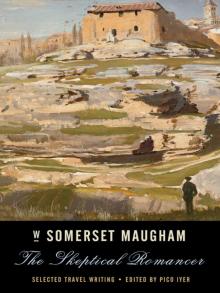 The Skeptical Romancer: Selected Travel Writing
The Skeptical Romancer: Selected Travel Writing The Summing Up
The Summing Up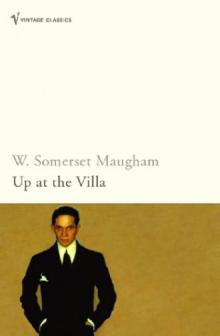 Up at the Villa
Up at the Villa The Razor's Edge
The Razor's Edge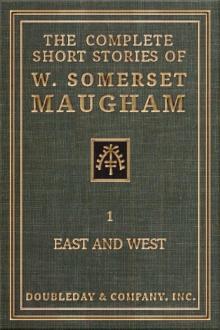 The Complete Short Stories of W. Somerset Maugham: East and West (Vol. 1 of 2))
The Complete Short Stories of W. Somerset Maugham: East and West (Vol. 1 of 2))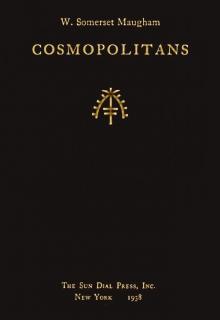 Cosmopolitans
Cosmopolitans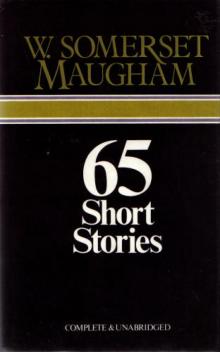 65 Short Stories
65 Short Stories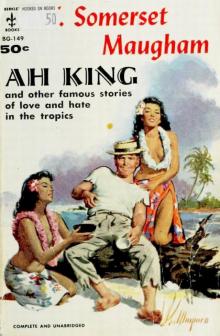 Ah King (Works of W. Somerset Maugham)
Ah King (Works of W. Somerset Maugham) Collected Short Stories: Volume 1
Collected Short Stories: Volume 1 Collected Short Stories Volume 2
Collected Short Stories Volume 2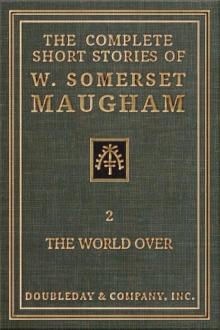 The Complete Short Stories of W. Somerset Maugham - II - The World Over
The Complete Short Stories of W. Somerset Maugham - II - The World Over Collected Short Stories Volume 4
Collected Short Stories Volume 4 Theatre
Theatre Short Stories
Short Stories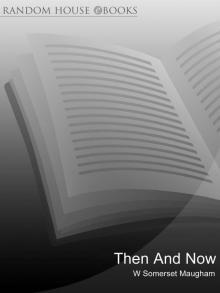 Then and Now
Then and Now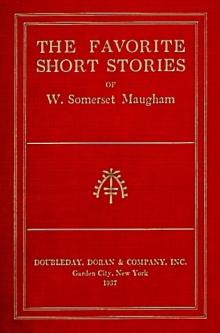 The Favorite Short Stories of W. Somerset Maugham
The Favorite Short Stories of W. Somerset Maugham Of Human Bondage
Of Human Bondage The Magician
The Magician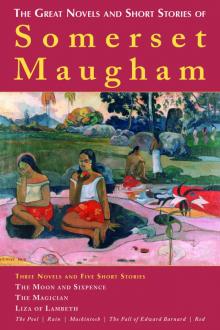 The Great Exotic Novels and Short Stories of Somerset Maugham
The Great Exotic Novels and Short Stories of Somerset Maugham A Writer's Notebook
A Writer's Notebook Christmas Holiday
Christmas Holiday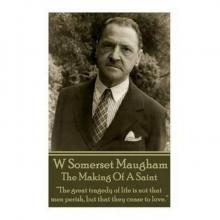 The Making of a Saint
The Making of a Saint Merry Go Round
Merry Go Round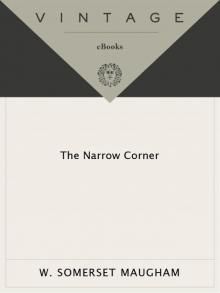 The Narrow Corner
The Narrow Corner Collected Short Stories Volume 3
Collected Short Stories Volume 3 Ten Novels and Their Authors
Ten Novels and Their Authors Ashenden
Ashenden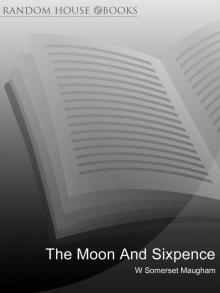 The Moon and Sixpence
The Moon and Sixpence Cakes and Ale
Cakes and Ale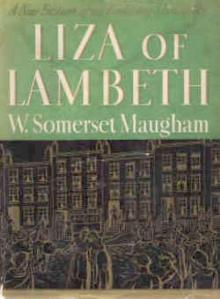 Liza of Lambeth
Liza of Lambeth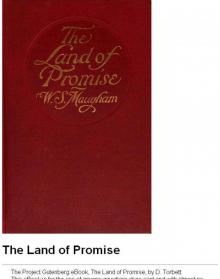 The Land of Promise: A Comedy in Four Acts (1922)
The Land of Promise: A Comedy in Four Acts (1922) A Writer's Notebook (Vintage International)
A Writer's Notebook (Vintage International)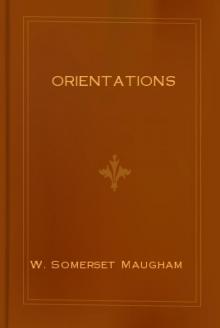 Orientations
Orientations Selected Masterpieces
Selected Masterpieces Mrs Craddock
Mrs Craddock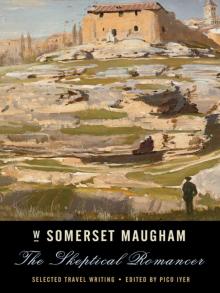 The Skeptical Romancer
The Skeptical Romancer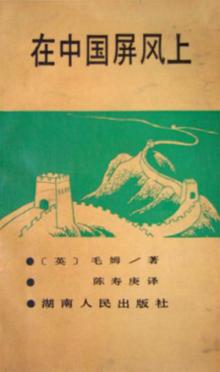 On a Chinese Screen
On a Chinese Screen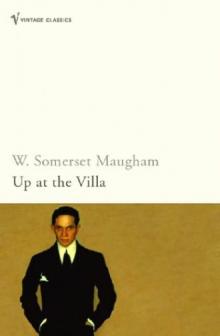 (1941) Up at the Villa
(1941) Up at the Villa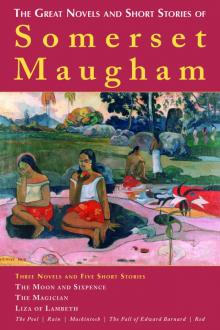 The Great Novels and Short Stories of Somerset Maugham
The Great Novels and Short Stories of Somerset Maugham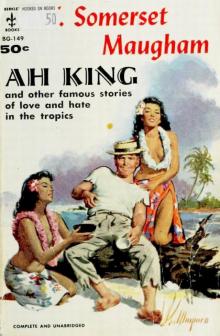 Ah King
Ah King The Explorer
The Explorer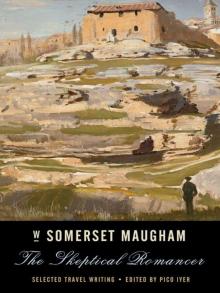 The Skeptical Romancer: Selected Travel Writing (Vintage Departures)
The Skeptical Romancer: Selected Travel Writing (Vintage Departures)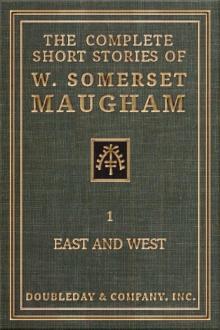 The Complete Short Stories of W. Somerset Maugham - I - East and West
The Complete Short Stories of W. Somerset Maugham - I - East and West